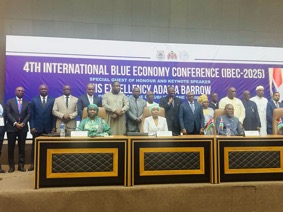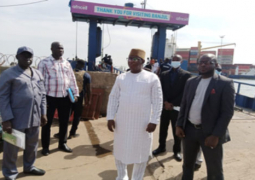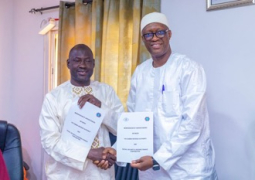
The event is being organised by the Regional Maritime University (RMU) in collaboration with the Dar es Salaam Maritime Institute, under the auspices of the Ministry of Transport, Works, and Infrastructure of The Gambia.
Under the theme “Harnessing the Blue Economy: Leveraging Innovation for Sustainable Development,” the conference brought together over 600 stakeholders, including policymakers, experts, and industry leaders, to discuss strategies for maximising the benefits of the Blue Economy while ensuring environmental sustainability.
The United Nations Department of Economic and Social Affairs (DESA) defines the Blue Economy as the sustainable use of ocean resources for economic growth, improved livelihoods, and ecosystem health. The sector generates between $3 billion to $6 billion annually, supporting employment and vital ecosystem services. Fisheries alone contribute an estimated $100 million and provide 260 million jobs worldwide.
Speaking at the opening ceremony, Hon. Ebrima Sillah, the minister for Transport, Works, and Infrastructure, emphasised the significance of the Blue Economy in Africa’s development, highlighting the need for innovation and sustainability.
“Our mission is clear: to harness the Blue Economy by leveraging innovative and sustainable development. This means integrating maritime safety, climate action, and technological advancements to unlock the full potential of our oceans and water bodies,” he stated.
Hon. Sillah stressed that the Blue Economy is not only crucial for economic growth but also essential for sustaining livelihoods and protecting marine ecosystems. He called for collective responsibility in safeguarding marine life and strengthening Africa’s position in global maritime trade.
“Imagine the untapped opportunities in Africa, which has 38 coastal and island states with a coastline exceeding 47,000 km. The potential is vast, possibly greater than gold and diamonds,” he remarked.
In his address, Vice President Mohammed Hassan B.S. Jallow underscored the Blue Economy’s transformative potential for economic growth, job creation, and environmental preservation.
“Our oceans are not just vast bodies of water; they are the lifeblood of our planet, covering more than 70% of the Earth’s surface. They provide food, livelihoods, and endless opportunities,” he stated.
He warned that Africa risks underutilising its ocean resources unless comprehensive policies are developed to address challenges within the sector. He pledged The Gambia’s commitment to establishing a national blue economy strategy prioritising sustainable practices, environmental protection frameworks, and economic opportunities for coastal communities
“The Gambia, as a coastal state, is strategically positioned to benefit from the Blue Economy. Our goal is to develop a national strategy with clear, measurable outcomes,” he affirmed.
Fatou Diouf, Senegal’s minister of Industry and Trade, highlighted the Blue Economy as a key driver of economic growth, tourism, and employment in Africa. She stressed the importance of regional cooperation, urging African nations to adopt policies that protect maritime resources while promoting sustainable development.
“The Blue Economy offers Africa immense potential, but we must work together to prevent resource exploitation. Stronger regional policies and collaborations are needed to ensure long-term benefits,” she said.





